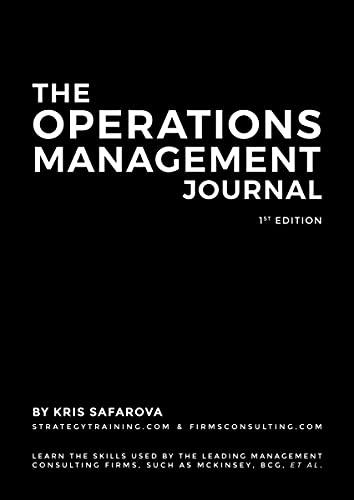Question
You are the owner and President of this established and profitable computer matching dating service that caters specifically to the population of one very large
You are the owner and President of this established and profitable computer matching dating service that caters specifically to the population of one very large urban centre. You have a 20-year history of creating successful 'love matches' for your clients who live in this city. The MetroMatch mission is to:
...provide a space for people to meet and establish romantic connections with each other. Whether it is a single date, a meaningful relationship, or an enduring marriage, our mission is to bring like-people together in a safe and respectful way. (James Docker)
Your service has relied on bringing people into your storefront to finish a comprehensive set of psychometric tools that are capable of using algorithms to match people on a broad range of compatibility measures. With the increase of dating apps and "hookup sites" on the internet you have seen your client base, and therefore your profits, continually decline in recent years. This is the case even though your computerized system for creating solid matches remains far superior to any of the on-line services. You have decided that it is necessary to go on-line to expand your client base within this city and perhaps beyond.
You have two trusted managers who have been with you since the early days of MetroMatch; the IT Manager (Temperament: SJ) who leads the team that continues to develop, operate, and maintain the computerized matching system, and the Business Manager (Temperament: NF) who runs your sales and marketing team. Each of these managers is resisting the change to providing services over the internet and have begun to demonstrate behaviours contrary to the core values of the company.
The IT Manager Is worried that moving services to the internet will make a much greater demand for services. This would mean that he will have to lead a much larger team of computer specialists then his current staff of six technicians and programmers. He is already having difficulty "controlling these stupid people", as he is inclined to say to you although he has never been inappropriate with them directly. In fact, he also has a turnover problem as he has only managed to keep two of the current six employees for more than three years even though the company pay and benefits are at the high end of industry standards. It is quite clear that he has always been more interested in managing the technology over leading people. Still, he fears that if he lost his two most experienced people that he could never leave the computers and would have no personal life. You can't afford to lose your IT Manager as he and you share certain software patents vital to your business, and with the decline in business you can't afford to 'buy him out'. In short, your business model requires that he remain part of the business going forward, at least until a point where you might be able to buy out the patents on the software that is the key to your success thus far.
Until now MetroMatch has relied on a local market drawn from the large city in which your business is located. Now it is your intention to sell your services to a wider market that includes the commuter communities surrounding your city.
Your Business Manager does not know these suburban communities well as she has always been a self-described 'city girl' who does not drive, only takes the subway, and seldom leaves the downtown core of her beloved city. In addition, you believe very strongly that she is concerned that she doesn't have the knowledge, expertise, or connections necessary to market and sell effectively on the internet. As worrisome to her is the fact that several of her younger employees appear to possess these social media skills. Recently she has spent a good deal of time being highly critical of those she feels are most capable of replacing her (not that you are looking to replace her, but she nonetheless seems to fear that you might do so). Several of these employees would like to leave the company due to her constant criticism, unreasonable work demands, and overall attitude of disrespect toward them. They have shared with you that their boss (the Business Manager) was not at all like she is now before the decision to move services from in-person to online; her behaviour toward them has changed rather dramatically since the change in the business model was announced.
You are a highly ethical employer who expects all of your employees to be treated with dignity and respect. Moreover, you feel that people should be acknowledged for their skills and contributions to the company. You do not value people competing with one another to protect one's self-esteem, and you expect people to support the mission before self-interest.
On the basis of your analysis, what measures would you undertake to capitalize on the psychological strengths of your team and address those inhibitory factors that are operating which currently threaten to turn your successful business into one unable to compete even with your substantial technological advantage over any of your competition. Detail what you will do if your first efforts at intervention prove ineffective. That is, what would your alternative plan be (i.e., your "Plan B") if your initial efforts to realign behaviour and cultural dynamics fail to produce your intended outcomes.
Step by Step Solution
There are 3 Steps involved in it
Step: 1

Get Instant Access to Expert-Tailored Solutions
See step-by-step solutions with expert insights and AI powered tools for academic success
Step: 2

Step: 3

Ace Your Homework with AI
Get the answers you need in no time with our AI-driven, step-by-step assistance
Get Started


